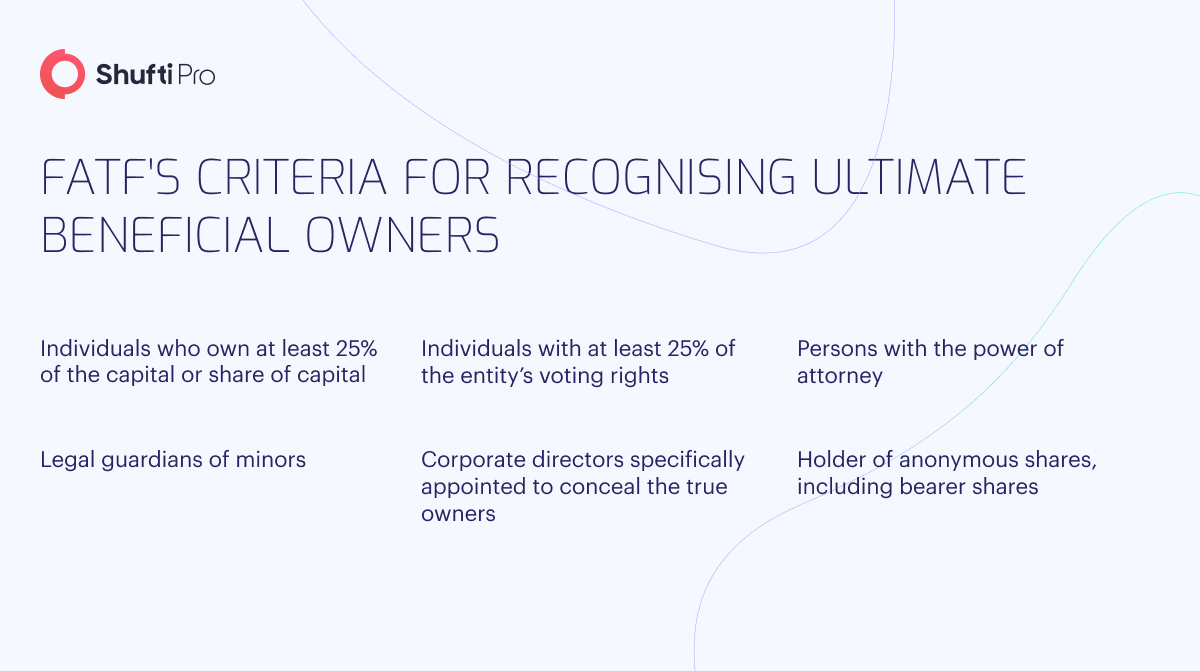Understanding UBOs: A Critical Component in Enhancing Security in the Financial Sector

Regulated entities must be aware of who they are interacting with. Validating the real identities of legal or natural individuals, whether they be customers or business partners, is essential to meet global regulations.
The UN Office on Drugs and Crimes (UNODC) estimates that 2–5% of the world’s GDP is annually laundered worldwide. By identifying a UBO, a firm can prevent itself from facilitating any illegal activities, which would aim to escape legal ramifications by hiding the identities of the beneficial owners. Identifying UBOs helps the financial sector avoid monetary losses and safeguards its reputation.
Understanding UBOs and Their Risk Level
Ultimate Beneficial Owners (UBOs) are the persons who ultimately own or run a firm. Although they are not directly known as the owner and are not illegal, they are often used to perpetrate crime.

UBOs may pose different risk levels that any business must know before establishing a relationship.
1. Low-Risk UBOs
Companies under this category pose little to no risk of money laundering and will require simplified due diligence checks. Simply collecting their personal information or a strict identity verification on state documents will be sufficient in the case of low-risk UBOs.
2. Medium-Risk UBOs
Entities included on a Politically Exposed Persons (PEP) list but not on other sanctions lists might be categorised as medium risk. Other medium-risk firms might also fit into this group, depending on their capital levels.
These cases should involve a KYC procedure that is quite similar to that for high-risk UBOs:
- Run more thorough general searches to see if the subject has recently been exposed to any risks, such as legal concerns or media attention.
- A thorough examination of wealth disparities, especially for medium-risk UBOs, may not be subject to any sanctions but have a higher risk of corruption.
- Verify any transactions they are doing in comparison to their reported sources of revenue and overall wealth to ensure there are no deviations that might point to illicit activity.
- Gather quantitative proof that the person’s acts have been considered non-criminal.
- Ensure these actions are repeated consistently, ask for updates if the situation changes, and keep track of any changes.
3. High-Risk UBOs
High-risk UBOs are subject to Enhanced Due Diligence (EDD) procedures. Approaching high-risk people with tangential links to people identified on sanction lists or those who have been somehow narratively sanctioned, such as family members of sanctioned people, should be handled cautiously. Customers who were once seen as low-risk may become high-risk as regulations change, and in these circumstances, being able to deliver your data accurately will be beneficial for your bottom line.
UBO Requirements in the European Union
Financial institutions within the EU are required to detect UBOs when dealing with commercial customers. UBO identification was first mandated under the EU’s 4th AML Directive (4AMLD), and since then, many member states have implemented laws that enforce reporting obligations. Even though every member state of the EU has its laws, all of them must follow the 4AMLD. Member states must create publicly accessible registers for corporations, trusts, and other legal entities under the fifth AML Directive. However, not all the registers are available to the public yet, and there are several issues with the authenticity and completeness of the UBO databases. Workers, officials, and entities acting on behalf of organisations in the EU are now subject to criminal prosecution under the EU’s Sixth AML Directive.
UBO Requirements in the US
The Financial Crimes Enforcement Network’s (FinCEN) Customer Due Diligence final rule, which went into effect on May 11, 2018, includes similar beneficial ownership requirements in the US. The CDD Rule places a new responsibility on these financial companies to identify and validate the identities of the beneficial owners of legitimate entity customers with several exceptions and exemptions.
The rule defines financial companies as banks, mutual funds, broker-dealers, merchants that sell futures commissions, and commodity brokers. A legal entity client can include companies, limited liability firms, limited or general partnerships, commercial trusts, and other similar entities. According to the standard, beneficial owners own at least 25% of the legal entity and have sufficient power to run, direct, or control it.
US business must report a UBO’s full legal name, birth date, present home or place of business, and official identification number to FinCEN under the Corporate Transparency Act.
UBO Standards Worldwide
Different nations have international treaties which demand beneficial ownership disclosures. The Financial Action Task Force (FATF) established beneficial ownership criteria in 2003, and 198 governments agreed to stricter FATF standards in 2012. Two years later, a policy declaration at the G20 Brisbane Summit emphasised UBO transparency. As per the declaration, countries must ensure that reputable authorities have prompt access to appropriate, accurate, and up-to-date information about legal persons’ beneficial ownership.
However, according to a 2016 FATF assessment, just two G20 countries had achieved significant efficacy in creating beneficial ownership criteria. The FATF recognises the difficulty in implementing efficient, beneficial ownership transparency standards. However, technologies and methods that accelerate and enhance accuracy can pave the way forward. The FATF report, legal changes in Europe and the United States, and significant corruption revelations have pressured other G20 countries to implement robust beneficial ownership reporting systems.
How Can Shufti Help?
Shufti offers a globally trusted Know Your Business (KYB) solution provider, screening customers against 1700+ international watchlists to mitigate the risk of money laundering. Our AI-powered KYB solution conducts checks against UBOs, PEPs, and those having negative media coverage within seconds. Not only it keeps scammers at bay, but it also helps the financial sector to meet compliance quickly.
Want to know more about how a robust KYB solution helps the financial sector verify UBOs?











